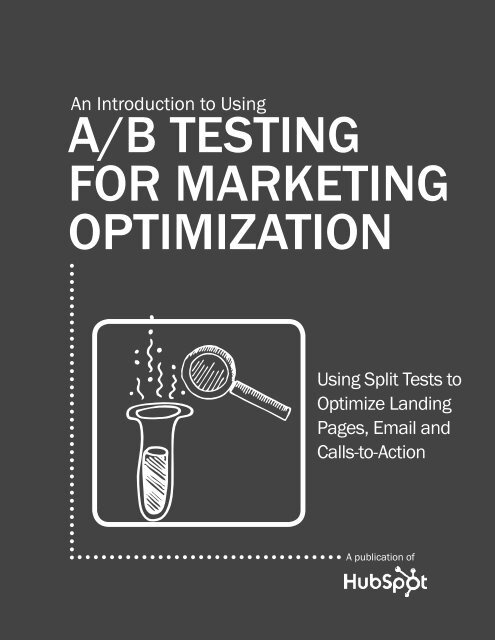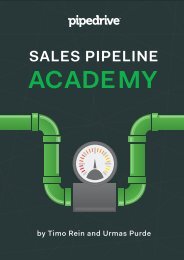A/B TESTING FOR MARKETING OPTIMIZATION
A/B TESTING FOR MARKETING OPTIMIZATION
A/B TESTING FOR MARKETING OPTIMIZATION
You also want an ePaper? Increase the reach of your titles
YUMPU automatically turns print PDFs into web optimized ePapers that Google loves.
An Introduction to Using<br />
a/B TesTing<br />
for markeTing<br />
opTimizaTion<br />
Using Split Tests to<br />
Optimize Landing<br />
Pages, Email and<br />
Calls-to-Action<br />
A publication of
2 An introduction to A/b testing<br />
An introduction to A/b testing<br />
3<br />
is THis Book rigHT for me?<br />
Not quite sure if this ebook is right for you? See the below description to determine if<br />
your level matches the content you are about to read.<br />
inTroDUCTorY<br />
Introductory content is for marketers who are new to the subject.<br />
This content typically includes step-by-step instructions on how<br />
to get started with this aspect of inbound marketing and learn its<br />
fundamentals. After reading it, you will be able to execute basic<br />
marketing tactics related to the topic.<br />
inTermeDiaTe<br />
Intermediate content is for marketers who are familiar with the<br />
subject but have only basic experience in executing strategies and<br />
tactics on the topic. This content typically covers the fundamentals<br />
and moves on to reveal more complex functions and examples.<br />
After reading it, you will feel comfortable leading projects with this<br />
aspect of inbound marketing.<br />
aDVanCeD<br />
Advanced content is for marketers who are, or want to be, experts<br />
on the subject. In it, we walk you through advanced features of<br />
this aspect of inbound marketing and help you develop complete<br />
mastery of the subject. After reading it, you will feel ready not only<br />
Share This Ebook! Share This Ebook!<br />
to execute strategies and tactics, but also to teach others how to<br />
be successful.<br />
This ebook!<br />
HUbSPOT’S ALL-IN-ONE<br />
mArkETINg SOfTwArE<br />
... brings your whole marketing world together<br />
in one, powerful, integrated system.<br />
get found: Help prospects find you online<br />
Convert: Nurture your leads and drive conversions<br />
analyze: measure and improve your marketing<br />
plus more apps and integrations<br />
request A demo Video Overview<br />
ULEAd bLOggINg<br />
gENErATION<br />
MEmAIL &<br />
SEArCH<br />
AUTOmATION<br />
gLEAd<br />
mANAgEmENT<br />
q&<br />
SOCIAL mEdIA<br />
s<br />
OPTImIzATION<br />
Y mArkETINg<br />
ANALyTICS<br />
www.HUbSPOT.COm www.HUbSPOT.COm
4 An introduction to A/b testing<br />
An introduction to A/b testing<br />
5<br />
an inTroDUCTion To Using a/B<br />
TesTing for markeTing opTimizaTion<br />
Edited by magdalena georgieva<br />
maggie georgieva is an inbound marketing<br />
manager at HubSpot responsible for creating<br />
new offers, including ebooks and webinars.<br />
She has previously helped with HubSpot’s<br />
email marketing program and the company’s<br />
landing page creation and optimization. maggie<br />
is a prolific marketing blogger and has also<br />
written for publications like bostInnovation.com<br />
and The St. Petersburg Times. follow me on TwiTTer<br />
@mgieVa<br />
ConTenTs<br />
10 gUiDelines for effeCTiVe a/B TesTing /9<br />
wHaT VariaBles YoU sHoUlD TesT /17<br />
a/B TesTing Case sTUDies /31<br />
rUnning & eValUaTing YoUr TesTs /39<br />
ConClUsion & aDDiTional resoUrCes /50<br />
Share This Ebook! Share This Ebook!<br />
www.HUbSPOT.COm www.HUbSPOT.COm
“<br />
6 An introduction to A/b testing<br />
An introduction to A/b testing<br />
7<br />
Why should<br />
I conduct<br />
A/B testing?<br />
”<br />
A/b testing, also known as split testing, is a method of testing through which marketing variables<br />
are compared to each other to identify the one that brings a better response rate. In this context,<br />
the element that is being testing is called “control” and the element that is argued to give a better<br />
result is called “treatment.”<br />
Running A/B tests in your marketing initiatives is a great way to learn how to drive more traffic to<br />
your website and generate more leads from the visits you’re getting. Just a few small tweaks to<br />
a landing page, email or call-to-action can significantly affect the number of leads your company<br />
attracts.<br />
? ONLy<br />
The insights stemming from split tests can drastically improve the conversion rates of your landing<br />
pages and the clickthrough rates of your website calls-to-action and email campaigns. In fact, A/b<br />
testing of landing pages can generate up to 30-40% more leads for b2b sites and 20-25% more<br />
Such increases in lead generation can provide a huge competitive advantage for your company. In<br />
fact, chances are your competitors aren’t doing A/b testing right.<br />
40% Of<br />
mArkETErS VALIdATE<br />
TEST rESULTS.<br />
mArkETINgSHErPA LANdINg PAgE OPTImIzATION<br />
bENCHmArk SUrVEy, 2011<br />
“In our ROI-driven world of digital marketing, testing without calculating statistical significance of<br />
the data is not much different than not testing at all,” write marketingSherpa in its report.<br />
with such an effective lead generation tool, you can easily create more opportunities for your sales<br />
team and get ahead of your competitors. with the right software, A/b testing costs next to nothing<br />
to implement. And although sometimes it’s the more complex elements that need to be revised,<br />
some of the most dramatic results come from quick and simple changes. In other words, if you’re<br />
not A/b testing, you’re missing out on some serious lead generation boost.<br />
leads for eCommerce sites.<br />
Share This Ebook! Share This Ebook!<br />
www.HUbSPOT.COm www.HUbSPOT.COm<br />
40%<br />
60%
8 An introduction to A/b testing<br />
An introduction to A/b testing<br />
9<br />
A/b TESTINg Or mULTIVArIATE TESTINg:<br />
wHAT’S THE dIffErENCE?<br />
Although these two terms are both often thrown around in the marketing world, multivariate and<br />
A/b testing are not the same thing.<br />
a/B<br />
TesTing<br />
A/b testing allows you to only test one variable at a time. It’s used<br />
to pick the better out of two variables. for instance, if you are<br />
testing the background color of your landing pages to determine<br />
which one helps you generate the most conversions, you might<br />
test red vs. blue. you can also test on the page level, which<br />
means that you are looking at the entire page as the variable.<br />
multivariate testing, on the other hand, enables you to test many<br />
variables simultaneously. Theoretically, multivariate testing<br />
combines a series of simultaneous A/b tests. In order to conduct<br />
statistically significant multivariate testing, you need to have a lot<br />
of traffic (the type of traffic youTube and google get.)<br />
This ebook covers A/b testing, but many of the practices mentioned in it can be applied to<br />
multivariate testing as well. Let’s dive into A/b testing and start with a look at how to create an<br />
effective A/B test and how to measure its significance.<br />
mUlTiVariaTe<br />
TesTing<br />
CHapTer 1<br />
10 gUiDelines<br />
for effeCTiVe<br />
a/B TesTing<br />
Share This Ebook! Share This Ebook!<br />
www.HUbSPOT.COm www.HUbSPOT.COm
10 An introduction to A/b testing<br />
An introduction to A/b testing<br />
11<br />
“<br />
A/b testing can quickly give rise to a number of<br />
questions. what should you start testing? How<br />
long should the test last? Things get confusing<br />
fast.<br />
There are certain guidelines you should keep<br />
in mind before you implement your tests. In<br />
this section we will cover some best practices<br />
that will make it much easier to measure your<br />
results and find out which variation performed<br />
better. Such knowledge will guide you in figuring<br />
out how to best optimize your landing pages,<br />
calls-to-action and email.<br />
Remember, a simple change<br />
can drive big results.<br />
”<br />
onlY ConDUCT one TesT aT a Time<br />
If you test an email campaign that directs to a landing page at the same time that you’re A/b<br />
testing that landing page, your results can get muddled pretty easily. How would you know which<br />
change caused the increase in leads?<br />
As a general rule, and especially if you’re relatively new to the A/b testing method, don’t conduct<br />
multiple tests at the same time.<br />
Share This Ebook! Share This Ebook!<br />
www.HUbSPOT.COm www.HUbSPOT.COm<br />
#1<br />
TesT one VariaBle aT a Time<br />
#2<br />
In order to evaluate how effective an element on your page, call-to-action or email campaign is,<br />
you have to isolate that variable in your A/b test. Only test one element at a time. Note that by<br />
taking the entire page, email or CTA as the variable, you can achieve drastic improvement.<br />
#3<br />
TesT minor CHanges, Too<br />
Although it’s reasonable to think that big, sweeping changes can increase your lead generation<br />
numbers, the small details are often just as important. while creating your tests, remember<br />
that even a simple change, say, switching the color of your call-to-action button, can drive big<br />
improvements. In fact, these sorts of changes are usually easier to measure than the bigger ones.
12 An introduction to A/b testing<br />
An introduction to A/b testing<br />
13<br />
YoU Can a/B TesT<br />
THe enTire elemenT<br />
while you can certainly test a button color or a background shade, you should also consider<br />
making your entire landing page, call-to-action or email a variable. Instead of testing single design<br />
elements, such as headlines and images, design two completely different pages and test them<br />
against each other. Now you’re working on a higher level. This type of testing yields the biggest<br />
improvements, so consider starting with it before you continue your optimization with smaller<br />
tweaks.<br />
#5<br />
measUre as far Down THe<br />
fUnnel as possiBle<br />
#4<br />
Sure, your A/b test might have a positive impact on your landing page conversion rate, but how<br />
about your sales numbers? A/B testing can have a significant effect on your bottom line. You may<br />
even see that a landing page that converted fewer prospects produced more sales. As you create<br />
your A/b test, consider how it affects metrics such as clickthrough rates, leads, traffic-to-lead<br />
conversion rates, and demo requests.<br />
CliCkTHroUgH<br />
raTe<br />
ConVersion<br />
raTe<br />
#5<br />
mEASUrE AS<br />
fAr dOwN<br />
THE fUNNEL<br />
AS POSSIbLE<br />
Share This Ebook! Share This Ebook!<br />
www.HUbSPOT.COm www.HUbSPOT.COm<br />
leaDs<br />
Demo<br />
reqUesTs<br />
sales
14 An introduction to A/b testing<br />
An introduction to A/b testing<br />
15<br />
seT Up ConTrol & TreaTmenT<br />
In any experiment, you need to keep a version of the original element you’re testing. when<br />
conducting A/b tests, set up your unaltered version as your “control:” the landing page, call-to-<br />
action or email you would normally use. from there, build variations, or “treatments:” pages, calls-<br />
to-action or email you’ll test against your control.<br />
for example, if you are wondering whether including a testimonial on a landing page would make a<br />
difference, set up your control page with no testimonials. Then create your variation(s).<br />
• Variation A: Control (the unaltered, original version)<br />
• Variation B: Treatment (the optimized version which you expect to perform better)<br />
The screenshot below is an example of HubSpot’s advanced landing pages A/b testing tool. you<br />
can easily clone the control and modify it to create a treatment page.<br />
#6<br />
DeCiDe wHaT YoU wanT To TesT<br />
As you optimize your landing pages, calls-to-action and email, there are a number of variables you<br />
can test. you don’t have to limit yourself to testing only color background or text size. Look at the<br />
various elements on your marketing resources and their possible alternatives for design, wording,<br />
Share This Ebook! Share This Ebook!<br />
www.HUbSPOT.COm www.HUbSPOT.COm<br />
layout.<br />
#7<br />
In fact, some of the areas you can test might not be instantly recognizable. for instance, you can<br />
test different target audiences, timing, alignment between an email and a landing page, etc.<br />
spliT YoUr sample groUp ranDomlY<br />
In order to achieve conclusive results, you need to test with two or more audiences that are equal.<br />
for instance, in email A/b testing each of your email variations must have as similar a group of<br />
recipients as possible. List sources, list type, and the length of time a particular name has been on<br />
a list are all factors that may cause large differences in response rates. your test results will not be<br />
conclusive or you may draw the wrong conclusions if you do not split your lists randomly.<br />
If you want to compare the performance of two or more lists, keep all other aspects of the design<br />
and timing identical so you get clean results based on list and nothing else.<br />
#8
16 An introduction to A/b testing<br />
An introduction to A/b testing<br />
17<br />
TesT aT THe same Time<br />
Timing plays a significant role in your marketing campaign’s results – be it time of day, day of the<br />
week, or month of the year. If you were to run test A during one month and test b a month later,<br />
you wouldn’t know whether the changed response rate was a result of the different template or the<br />
different month.<br />
#9<br />
A/b testing requires you to run the two or more variations at the same time. without simultaneous<br />
testing, you may be left second-guessing your results.<br />
DeCiDe on neCessarY<br />
signifiCanCe Before TesTing<br />
Before you launch your test, think about how significant your results should be in order for you<br />
to decide that the change should be made to your website or email campaign. Set the statistical<br />
significance goal for your winning variation before you start testing. 97-99% statistical significance<br />
is usually a good percentage to aim for.<br />
#10<br />
CHapTer 2<br />
wHaT<br />
VariaBles YoU<br />
sHoUlD TesT<br />
Share This Ebook! Share This Ebook!<br />
www.HUbSPOT.COm www.HUbSPOT.COm
18 An introduction to A/b testing<br />
An introduction to A/b testing<br />
19<br />
“<br />
As you build landing pages, call-to-action and email campaigns,<br />
you’ve probably wondered about the elements you can test<br />
and optimize to increase conversion rate. Should you change<br />
the background color of the landing page? How can you modify<br />
the language on the call-to-action to attract the most clicks?<br />
what if you removed all images from your email campaign?<br />
Not all variables are created equal, and some may prove more worthy<br />
of your time than others. In fact, there are some variables you shouldn’t<br />
bother testing at all because they won’t impact clickthrough or conversion<br />
rates all that much.<br />
What elements should I test<br />
and optimize?<br />
”<br />
you need to recognize the elements that you should spend most time<br />
testing and optimizing. In this section we will review both areas that are<br />
critical and some that are less critical for lead generation.<br />
elements that you can optimize<br />
on a lanDing page:<br />
You should start your optimization process by finding what types<br />
of offers convert the most visitors into leads and which offers<br />
help you push leads down the sales funnel.<br />
Share This Ebook! Share This Ebook!<br />
www.HUbSPOT.COm www.HUbSPOT.COm<br />
CopY<br />
How should you position your offer? what messaging<br />
will entice your reader? Should you add testimonials to<br />
strengthen the visitor’s incentive?<br />
offers<br />
for instance, at HubSpot we have found that ebooks perform better than webinars in converting<br />
visitors to leads, but webinars do better than ebooks in converting leads to customers. That<br />
has led us to maintain a balanced mix of content. more middle-of-the-funnel offers, such as<br />
consultations and demos, will most likely be characterized by high customer close rate.<br />
You can also test different topics and find out how they compare in driving business results.<br />
People looking for information online will pay attention to the description of your offer. Consider<br />
different landing page copy that can help you drive more conversions. for instance, bullet points<br />
and data-driven content have traditionally performed well for us, at HubSpot. Start with a radical<br />
test in which you compare a short, one-paragraph long description to longer but still valuable copy.
20 An introduction to A/b testing<br />
An introduction to A/b testing<br />
21<br />
form<br />
fielDs<br />
As we mentioned earlier, taking the entire page as the<br />
variable is the fastest way to achieve drastic results and<br />
produce a landing page that drives a lot of conversions.<br />
wHole<br />
page<br />
make iterations to the whole page that affect image placement, form length and its copy. Once<br />
you have a statistically significant result pointing to the variation that performed better, you can<br />
continue optimizing through smaller tweaks.<br />
Should your lead capture form only request an email<br />
address or should it ask for more information?<br />
l<br />
Inbound marketers diverge in their decision whether to place content behind<br />
a form or keep it form-free for all the world to see with no exchange of<br />
information. Some argue that forms create frictions in the lead generation<br />
process, while others believe that forms are essential for qualifying traffic<br />
and prioritizing work for the sales organization.<br />
Landing page A/b testing enables you to evaluate how your audience reacts to different questions--<br />
what prospects are willing to answer and what information they would rather not share. Form fields<br />
help you qualify leads and nurture them. (With form-free content, you have to relinquish more lead<br />
nurturing control -- you didn’t ask for their information, so how can you get back in touch with them<br />
unless they either bookmark your site?)<br />
form<br />
fielDs<br />
Share This Ebook! Share This Ebook!<br />
www.HUbSPOT.COm www.HUbSPOT.COm<br />
offer<br />
CopY image
22 An introduction to A/b testing<br />
An introduction to A/b testing<br />
23<br />
elements that you can optimize<br />
in a Call-To-aCTion:<br />
plaCemenT<br />
According to an Eyetrack III study, the best placement<br />
of online ads is in the top and left position. That makes<br />
sense: in the English language, we start reading from<br />
left to right and from top to bottom.<br />
However, copywriter dean rieck suggests that once your readers get used to a particular<br />
placement, they might start ignoring the call-to-action or ad. “So even the prime upper left area<br />
won’t work so well if you always put ads there,” rieck writes. The most effective placement<br />
could also depend on the context of the rest of the page, so make sure you do some testing. for<br />
instance, test the ideal top and left position versus a placement in which the call-to-action is right<br />
beneath the offer description. run an A/b test to see if you get more clicks and pick a winner.<br />
Size is tightly related to the context of the page and the other<br />
characteristics of your call-to-action. for instance, the CTA<br />
will naturally be large if it includes a graphic or an image that<br />
strengthens the message. Create an A/b test to see if a big call-<br />
to-action that adds value to the message--e.g. a customized blog<br />
CTA--attracts more clicks than its control.<br />
size<br />
There has been a huge debate revolving around usage<br />
of the color red for call-to-action design. Some graphic<br />
designers argue that red can increase clickthrough<br />
rates significantly. Others explain that the context of<br />
the web page should determine the color.<br />
Share This Ebook! Share This Ebook!<br />
www.HUbSPOT.COm www.HUbSPOT.COm<br />
CopY<br />
The Eyetrack III study also showed that in ads, website<br />
visitors read more text content than graphical content.<br />
“People looking for information are looking for text, not pictures,” writes dean. make sure your<br />
wording is clear, specific, and action-oriented. Do some testing to figure out what text will make<br />
visitors more likely to click. If you need more guidance on copywriting for calls-to-action, download<br />
our free ebook, which includes some specific tips and examples.<br />
Color<br />
when running A/b tests to determine the highest converting color, be mindful of your overall<br />
website design. While you want to keep the colors contrasting, make sure all of them fit in with<br />
your general website color scheme and avoid using patterns.<br />
while you should focus on your call-to-action text, don’t<br />
forget that graphics can help convey meaning and<br />
strengthen your message. Experiment with various shapes<br />
besides the standard button-like form and test how the<br />
new look affects your clickthrough rate.<br />
grapHiC
24 An introduction to A/b testing<br />
An introduction to A/b testing<br />
25<br />
grapHiC<br />
offer<br />
plaCemenT<br />
size<br />
CopY Color<br />
elements that you can optimize<br />
in YoUr email:<br />
M<br />
you must have noticed that many of the elements to test and<br />
optimize we have discussed so far overlap across different<br />
channels. Offers, copy and image are certainly some of the<br />
variables you want to always keep in mind. They apply to email<br />
marketing as well, so we won’t repeat them here but discuss the<br />
few new ones we haven’t mentioned so far.<br />
what’s the best way to lay out your email content to<br />
formaT<br />
drive the most engagement? Should your message be<br />
structured as a newsletter, digest or a dedicated send?<br />
A/b testing can help you determine the right format of your email marketing campaigns. for<br />
instance, newsletters can perform well in spreading the news about a few different pieces of<br />
information, such as events, new offers, discounts and event product announcements. dedicated<br />
sends, on the other hand, can help you drive the most conversions to one call-to-action. run an<br />
A/b test to determine which format yields the results you seek to achieve.<br />
Similar to testing formats, layout is another element that you<br />
can test and optimize for on an ongoing basis. Experiment<br />
with different image and call-to-action placement and watch<br />
not only your clickthrough rates, but also your conversions to<br />
laYoUT<br />
Share This Ebook! determine which layout is most effective.<br />
Share This Ebook!<br />
www.HUbSPOT.COm www.HUbSPOT.COm
26 An introduction to A/b testing<br />
An introduction to A/b testing<br />
27<br />
Timing<br />
Our Science of Timing research shows that the most<br />
clicks on email are seen on the weekend.<br />
So if you have been traditionally afraid of emailing on Saturdays and Sundays, it’s time to<br />
reconsider this practice and experiment with your timing.<br />
Effect of day-of-week on Clickthrough rate<br />
Sunday monday Tuesday wednesday Thursday friday Saturday<br />
Naturally, the optimal timing for sending marketing emails will vary by industry and even company.<br />
Should your prospect be sent your next email one hour later or one day later? Identify the best time<br />
to convert prospects into leads by running split tests.<br />
A/b email marketing tests that we ran at HubSpot in<br />
2011 showed that messages coming from a personal<br />
sender name receive higher CTr rate than messages<br />
from a generic sender name.<br />
senDer<br />
So instead of sending emails from Marketing Team, we started making the senders of our<br />
marketing emails be the real experts from our team. To reinforce this personalization and create<br />
consistency, we have been adding the person’s signature at the end of the message.<br />
Personalization is a well-known best practice in email marketing but you should still test sender<br />
names with your audience. Ensure that a change like this yields positive results for your company<br />
before you implement it.<br />
Subject lines are the part of emails that can grab your<br />
recipients’ attention immediately and convince them to open<br />
the email and read more. So you really want to get them right.<br />
Interestingly enough, subject lines are the part marketers seem to be testing the most about<br />
email. In marketingSherpa’s Email marketing benchmark survey of 2,735 professionals 72% of<br />
respondents said that they run A/B tests to determine a winning subject line. Yet only 35% find the<br />
tests effective.<br />
sUBjeCT<br />
lines<br />
If you decide on testing email subject lines, try to deduct a lesson from your experiment. Is it the<br />
length of the subject line, mention of a discount or certain formatting (e.g., brackets or colon) that<br />
made the difference?<br />
Share This Ebook! Share This Ebook!<br />
www.HUbSPOT.COm www.HUbSPOT.COm
28 An introduction to A/b testing<br />
An introduction to A/b testing<br />
29<br />
who are you sending email to? Segmentation can help you<br />
get high response rates because your recipients will find the<br />
messages particularly valuable.<br />
That will also increase the chances of them sharing your email with friends and coworkers. In<br />
fact, marketingSherpa’s survey shows that marketers find testing target audiences to be a pretty<br />
effective approach.<br />
80%<br />
70%<br />
60%<br />
50%<br />
40%<br />
30%<br />
20%<br />
10%<br />
0%<br />
72%<br />
35%<br />
61%<br />
25%<br />
50% 50%<br />
26%<br />
34%<br />
46%<br />
21%<br />
39%<br />
22%<br />
Usage Effectiveness<br />
34%<br />
32%<br />
32%<br />
41%<br />
30%<br />
TargeT<br />
groUp<br />
marketingSherpa Email marketing benchmark Survey<br />
Survey methodology: fielded July 2011, N=2,735<br />
42%<br />
29%<br />
26%<br />
15%<br />
22%<br />
senDer<br />
target-audience@hubspot.com<br />
TargeT<br />
groUp<br />
sUBjeCT<br />
formaT laYoUT<br />
Timing<br />
Share This Ebook! Share This Ebook!<br />
www.HUbSPOT.COm www.HUbSPOT.COm
30 An introduction to A/b testing<br />
An introduction to A/b testing<br />
31<br />
elements you shouldn’t<br />
BoTHer TesTing:<br />
d<br />
So far we’ve discussed some variables that you can test in order<br />
to optimize the performance of different marketing activities.<br />
However, A/b testing is time-consuming and you need to be<br />
smart about the elements you decide to optimize. Some of them<br />
don’t deserve your time.<br />
mINOr TExT CHANgES<br />
If you’re going to change your headline or subject line, change it drastically. The<br />
positioning and the content of your copy matter, but switching “The” to “A” isn’t going to<br />
make any sort of difference.<br />
gENErAL ImPrOVEmENTS<br />
If you know that something is an improvement, like a mobile-friendly email, there is no<br />
point in testing it to see how it compares to an email that is not optimized for mobile<br />
viewing. The switch certainly won’t hurt your marketing!<br />
CHapTer 3<br />
a/B TesTing<br />
Case sTUDies<br />
Share This Ebook! Share This Ebook!<br />
www.HUbSPOT.COm www.HUbSPOT.COm www.HUbSPOT.COm
32 An introduction to A/b testing<br />
An introduction to A/b testing<br />
33<br />
“<br />
Learn from real-life A/B<br />
testing examples below.<br />
”<br />
Now that we have covered some suggestions on<br />
elements that you can test and optimize, you’d probably<br />
like to see how these tests might look like. what are<br />
some real-life examples of A/b testing in action?<br />
In this section of the ebook we cover three A/b tests across different marketing channels. we<br />
explore what a split test for a landing page, call-to-action and email looks like. All of the examples<br />
that we discuss here have been conducted by members of the HubSpot marketing team and each<br />
test can teach you a lesson on A/B testing. More specifically, our three case studies covered here<br />
advise you to:<br />
OPTImIzE LANdINg PAgES THAT dON’T CONVErT AT A HIgH rATE<br />
STArT yOUr OPTImIzATION PrOCESS wITH AN OffEr TEST<br />
USE THE kNOwLEdgE yOU’VE gAINEd TO ImPrOVE ExISTINg PrOCESSES<br />
an example of<br />
a lanDing page TesT:<br />
This test was produced for the 2011 Landing Page Optimization Summit held by mECLAbS, the<br />
parent company of marketingSherpa & marketingExperiments. HubSpot was part of a live landing<br />
page optimization test in which the audience was given a control page and was asked to build a<br />
treatment page by incorporating changes that would positively affect conversion rates.<br />
Here is a screenshot of the control page:<br />
ConTrol<br />
Share This Ebook! Share This Ebook!<br />
www.HUbSPOT.COm www.HUbSPOT.COm
34 An introduction to A/b testing<br />
An introduction to A/b testing<br />
35<br />
The entire page was taken as a variable and was revamped. we changed the image and its<br />
placement and shortened the copy and the form. In an effort to drive a lot of traffic to this page, we<br />
did a heavy email marketing push, blog posts and social media promotion. The test was conducted<br />
using HubSpot’s landing page tools.<br />
Our A/b test results showed that the control converted at a rate of 47.91% and the treatment<br />
converted at a rate of 48.24%, an absolute difference of 0.3% which is a pretty negligible increase.<br />
The conclusion we arrived at is that the audience was highly motivated by the offer itself. So when<br />
running A/b tests, start with pages that have a low visitor-to-lead conversion rate. It’s pretty hard to<br />
beat a page that converts 47% of the traffic.<br />
TreaTmenT<br />
an example of<br />
a Call-To-aCTion TesT:<br />
The screenshot below is of a call-to-action A/b test that sought to compare two offer types. The<br />
image actually illustrates what HubSpot’s homepage used to look like in 2010!<br />
Originally, HubSpot’s homepage offered our community a seven-day free trial. However, we were<br />
curious to see if offering a longer trial period would entice more visitors to sign up. would it have a<br />
significant enough effect? In this case our control was a variation that offered the seven-day free<br />
trial and the treatment offered a 30-day free trial.<br />
ConTrol<br />
Share This Ebook! Share This Ebook!<br />
www.HUbSPOT.COm www.HUbSPOT.COm
36 An introduction to A/b testing<br />
An introduction to A/b testing<br />
37<br />
Results from the test showed that the 30-day free trial enticed more visitors and had a significant<br />
effect on conversion rates. The 30-Day free trial won with a 99.9% confidence rate and created a<br />
110% increase in HubSpot free trials. The control had a 0.326% visitor-to-free-trial conversion rate,<br />
while the treatment had a 0.709% visitor-to-trial conversion rate.<br />
TreaTmenT<br />
The takeaway emerging from this A/B test is that type of offer can exercise a tremendous influence<br />
over lead generation efforts. If you want to optimize your calls-to-action (and for that matter email<br />
and landing pages), comparing different offers is a great place to start. Such experiments will<br />
provide you with a better understanding of what prompts your visitors to convert into leads.<br />
an example of<br />
an email TesT:<br />
Subject lines are a critical element of email marketing. They have the power to grab the attention<br />
of recipients and impact clickthrough rates to a great extent. That is why we always want to make<br />
sure that we are using the right subject line when we are emailing our subscribers. we regularly<br />
conduct A/b tests to evaluate winning subject lines.<br />
but besides a subject line, recipients also see a sender name in their inbox. who is the email<br />
coming from? This sender name can make a difference on open and clickthrough rates. So in<br />
2011 we conducted a test to compare a generic “HubSpot” sender name to a personal name from<br />
someone on the marketing team.<br />
“<br />
Type of offer can exercise a<br />
tremendous influence over lead<br />
generation efforts.<br />
”<br />
Share This Ebook!<br />
3.00%<br />
2.00%<br />
1.00%<br />
0.00%<br />
Open rate<br />
0.96%<br />
0.73%<br />
Share This Ebook!<br />
Click Through rate<br />
from "HubSpot" from "maggie georgieva, HubSpot"<br />
www.HUbSPOT.COm www.HUbSPOT.COm<br />
8.00%<br />
7.00%<br />
6.00%<br />
5.00%<br />
4.00%<br />
6.57%<br />
7.10%<br />
CONTrOL - from “HubSpot” sender name<br />
TrEATmENT - from “maggie georgieva,<br />
HubSpot” sender name
38 An introduction to A/b testing<br />
An introduction to A/b testing<br />
39<br />
Our control had a 0.73% CTR and the treatment had a 0.96% CTR. With a confidence of 99.9%<br />
we had a clear winner. Our conclusion after this A/b test was that email sent by a real person<br />
are more likely to be clicked on than email sent from the company. So how does CTr impact our<br />
number of leads generated?<br />
The treatment got 292 more clicks than the control. Since our average visitor-to-lead conversion<br />
rate on landing pages is 45%, that means the treatment got us 131 more leads. That is great by<br />
itself but think about how valuable this lesson is when applied to our broader email marketing<br />
program. we took this insight and used it for the revamping of our lead nurturing campaigns,<br />
adding a personal sender name and signature to each of our messages. when your A/b tests lead<br />
to some significant results, use the knowledge you’ve gained to improve existing processes.<br />
CHapTer 4<br />
rUnning &<br />
eValUaTing<br />
YoUr TesTs<br />
Share This Ebook! Share This Ebook!<br />
www.HUbSPOT.COm www.HUbSPOT.COm www.HUbSPOT.COm
40 An introduction to A/b testing<br />
An introduction to A/b testing<br />
41<br />
“<br />
Let’s look into how you can conduct<br />
actual split tests.<br />
”<br />
Now that we have covered the reasons why you should run A/b tests, what variables to optimize<br />
and how these tests might look like, let’s look into the details around their actual implementation.<br />
How do you create multiple<br />
versions of the same<br />
element you are testing?<br />
How do you split traffic<br />
randomly? How do you<br />
know if your results are<br />
statistically significant?<br />
In this section we will look behind the scenes of a few tools that will enable you to do A/b testing<br />
and automate the process so that you don’t have to maintain a dozen excel spreadsheets. what’s<br />
more important, we will point you to the actions you can take after running a successful test.<br />
how to do conduct<br />
a lanDing page TesT:<br />
with landing page A/b testing you have one UrL and two or more versions of the page. when you<br />
send traffic to that URL, visitors will be randomly sent to one of your variations. Standard landing<br />
page A/b testing tools remember which page the reader landed on and will keep showing that<br />
page to the user. for statistical validity split tests need to set a cookie on each visitor to ensure<br />
the visitor sees the same variation each time they go to the tested page. This is how HubSpot’s<br />
advanced landing pages and google’s website Optimizer work.<br />
F F F<br />
A b C<br />
HubSpot’s advanced landing pages enable you to create A/b tests and track a number of metrics<br />
to evaluate how your experiment is performing. It keeps a record of the number of people who<br />
viewed each variation and number of the people who took the intended action. for example,<br />
it might inform you that each of your landing page variations was viewed 180 times, with the<br />
top-performing one generating 20 clicks and the lowest performing one generating five clicks.<br />
while this information is important, it’s not enough to make a decision about whether or not your<br />
results were significant.<br />
Share This Ebook! Share This Ebook!<br />
www.HUbSPOT.COm www.HUbSPOT.COm
42 An introduction to A/b testing<br />
An introduction to A/b testing<br />
43<br />
Y these variations got and what the corresponding number of form submissions is.<br />
DeTermine sTaTisTiCal signifiCanCe The screnshot below is an example of a landing page test that we ran at HubSpot using our<br />
from a high-level view, you can probably tell if your test<br />
results are significant or not. If the difference between<br />
the tests is very small, it may be that the variable<br />
you tested just doesn’t influence the behavior of your<br />
viewers.<br />
However, it’s important to test your results for statistical significance from a mathematical<br />
perspective. There are a number of online calculators you can use for this, including:<br />
SPLIT TEST CALCULATOr<br />
USEr EffECT’S SPLIT TEST CALCULATOr ANd dECISION TOOL<br />
VISUAL wEbSITE OPTImIzEr<br />
HubSpot’s advanced landing pages will tell you when the A/B test becomes statistically significant<br />
and whether you should continue the test or stop it. Once you’re done with the test, simply disable<br />
the variations that are losing and run with the winning page.<br />
advanced tool. In this example we wanted to see if including testimonials for one of our ebooks will<br />
positively affect conversions. from the data below we are able to see how many visitors each of<br />
The tool tells us that the best choice is Variation D: it converted at 62.2% (1% better than Variation<br />
E). However, we are also informed that this result is not statistically significant and are encouraged<br />
to continue this test. This led us to the conclusion that the difference between our tests is too<br />
small to affect the behavior of viewers.<br />
Share This Ebook! Share This Ebook!<br />
www.HUbSPOT.COm www.HUbSPOT.COm
44 An introduction to A/b testing<br />
An introduction to A/b testing<br />
45<br />
TesTing is aBoUT measUring oVer Time<br />
you may be tempted to check your campaign every<br />
day to try to figure out the results of your A/B test.<br />
This is okay, but don’t draw any conclusions from<br />
this information just yet. The reason you can’t make<br />
decisions yet is that you wouldn’t be fully measuring<br />
your A/b test, only monitoring it.<br />
That’s like deciding you should become a pro baseball player based on a Little League game<br />
where you hit a home run. Measurement looks at trends over time – wait a significant amount of<br />
time before analyzing your results.<br />
So how long should you wait? First, make sure you have sent enough traffic to the pages. (That<br />
is often a tough task for small businesses.) for a landing page A/b test, it’s a good idea to wait<br />
about 15-30 days before evaluating your results. This will allow you to see trends as well as any<br />
issues that may have popped up. It should also give you enough data to come up with an accurate<br />
conclusion.<br />
If even after you’ve waited for 15-30 days and sent a lot of traffic to your test you haven’t seen a<br />
statistically significant result, then your test probably wouldn’t make a big impact on conversions.<br />
don’t be afraid to move on to another, more radical experiment.<br />
t x<br />
if aT firsT YoU Don’T sUCCeeD, TrY again<br />
You may conduct an A/B test but not find statistically significant results. This doesn’t mean that<br />
your A/b test has failed. figure out a new iteration on your next test. for example, consider testing<br />
the same variable again with different variations, and see if that makes a difference. If not, that<br />
variable may have little bearing on your conversion rates, but there may be another element on<br />
your page that you can adjust to increase leads.<br />
Effective A/b testing focuses<br />
upon continuous improvement.<br />
remember that as long as<br />
you keep working towards<br />
improvement, you’re going in<br />
the right direction.<br />
“<br />
Effective A/B testing focuses<br />
upon continuous improvement.<br />
”<br />
Share This Ebook! Share This Ebook!<br />
www.HUbSPOT.COm www.HUbSPOT.COm
46 An introduction to A/b testing<br />
An introduction to A/b testing<br />
47<br />
how to do conduct<br />
a Call-To-aCTion TesT:<br />
Call-to-action split testing works pretty much the same way as landing page split testing. you<br />
create a few variations of your CTA, place them on the same page and they should be displayed to<br />
visitors randomly. The goal here is to determine which call-to-action attracts the most clicks.<br />
However, we mentioned earlier in this ebook that it is important to look for results further down<br />
in the sales funnel. So it will be most useful to know the number of conversions each of your CTA<br />
versions drove. This result is influenced by the landing page and how well it is aligned with the<br />
call-to-action. In the example below we used HubSpot’s Call-to-Action module to test the alignment<br />
between the same call-to-action and two different landing pages:<br />
HubSpot’s call-to-action module (screenshot showed on the previous page) enables you to quickly<br />
build A/b tests and drill down to the data that matters the most to your organization. for instance,<br />
you might look at the views-to-click rate in an effort to optimize the call-to-action, but if your click-<br />
to-submission rate is surprisingly low, then the problem might lie with the landing page. That is<br />
why, ultimately, you want to be keeping an eye on your view-to-submission rate and try to optimize<br />
that.<br />
!<br />
remember that you should be running only one<br />
A/b test at a time, so don’t try to optimize both the<br />
call-to-action and the landing page simultaneously.<br />
make changes to one variable at a time so that you<br />
understand which element triggered the results you<br />
are seeing.<br />
Share This Ebook! Share This Ebook!<br />
www.HUbSPOT.COm www.HUbSPOT.COm
48 An introduction to A/b testing<br />
An introduction to A/b testing<br />
49<br />
how to do conduct<br />
an email TesT: 72%<br />
$<br />
most email providers automate the split testing<br />
process and enable you to compare different elements<br />
about your email. They randomize the list of recipients<br />
into two or more groups (you need to ensure the<br />
groups are big enough to give you a statistically<br />
significant result) and associate each email variation<br />
to each of the groups.<br />
mailChimp, for instance, splits your email campaign to help you find out the best subject line and<br />
time of day to send an email. The great thing about a tool like this is that it can send the winner to<br />
the remainder of your group. This is a fantastic way to optimize your list and deliver the message<br />
that attracts the most attention.<br />
mailChimp and most standard email providers enable you to pick a winner based on either open<br />
rate or clickthrough rate. However, you also want to see which email is bringing in the most<br />
conversions. In other words, identify which variation, combined with the right landing page,<br />
delivers the best results. for this type of reporting you need to integrate your email marketing to<br />
marketing analytics.<br />
M<br />
Share This Ebook! Share This Ebook!<br />
www.HUbSPOT.COm www.HUbSPOT.COm<br />
80%<br />
70%<br />
60%<br />
50%<br />
40%<br />
30%<br />
20%<br />
10%<br />
0%<br />
marketingSherpa Email marketing benchmark Survey<br />
Survey methodology: fielded July 2011, N=2,735<br />
35%<br />
61%<br />
25%<br />
50% 50%<br />
26%<br />
34%<br />
46%<br />
21%<br />
39%<br />
22%<br />
Usage Effectiveness<br />
34%<br />
32%<br />
32%<br />
41%<br />
30%<br />
42%<br />
29%<br />
26%<br />
If we revisit the 2011 survey from marketingSherpa, we will see that the variables which present<br />
the best results when optimized are landing page and target audience. So even when it comes<br />
to improving your email marketing program, start by testing landing pages and put emphasis on<br />
segmentation. Such tests will suggest optimization strategies that can help you achieve the most<br />
effectiveness out of your marketing emails.<br />
15%<br />
22%
50 An introduction to A/b testing<br />
An introduction to A/b testing<br />
51<br />
ConClUsion<br />
& aDDiTional<br />
resoUrCes<br />
A/b testing gives you the opportunity to<br />
maximize conversion rates, solve problems, and<br />
challenge your assumptions. more importantly,<br />
A/b testing will significantly increase the<br />
knowledge base of your company by allowing<br />
you to determine a set of optimized practices to<br />
boost your overall rOI.<br />
In this ebook we covered the foundations of A/b testing, walking you through processes that can<br />
improve the performance of your landing pages, calls-to-action and email campaigns. you now<br />
know how to conduct split testing and what variables to isolate. you also know where to start and<br />
what to spend the least time on. As you begin split testing, keep in mind that all these optimization<br />
efforts are directly tied to increased lead generation and customer acquisition.<br />
Share This Ebook! Share This Ebook!<br />
www.HUbSPOT.COm www.HUbSPOT.COm<br />
www.HUbSPOT.COm<br />
“<br />
These optimization efforts are directly<br />
tied to increased lead generation and<br />
customer acquisition.<br />
”<br />
0rOI
52 An introduction to A/b testing<br />
An introduction to A/b testing<br />
53<br />
aDDiTional resoUrCes<br />
Check out some additional HubSpot resources on A/b<br />
testing if you are interested in learning more:<br />
Tools<br />
HubSpot’s Advanced Landing Pages<br />
HubSpot’s Call-to-Action module<br />
Blog posts<br />
why marketers A/b Testing Shouldn’t be Limited To Small Changes<br />
9 A/b Tests mere marketing mortals Can Use to Increase Leads<br />
5 best Practices for website A/b Testing<br />
10 do’s and don’ts of A/b Testing<br />
How to Determine If Your A/B Test Results Are Significant<br />
ebooks and webinars<br />
Top 7 Inspirational Email Tests<br />
what’s worth A/b Testing?<br />
rUn powerfUl<br />
a/B TesTs<br />
Sign up for HubSpot’s 30-day trial and start running easy-touse<br />
landing page and call-to-action A/b tests.<br />
www.Hubspot.com/free-Trial<br />
Share This Ebook! Share This Ebook!<br />
www.HUbSPOT.COm www.HUbSPOT.COm<br />
www.HUbSPOT.COm

















